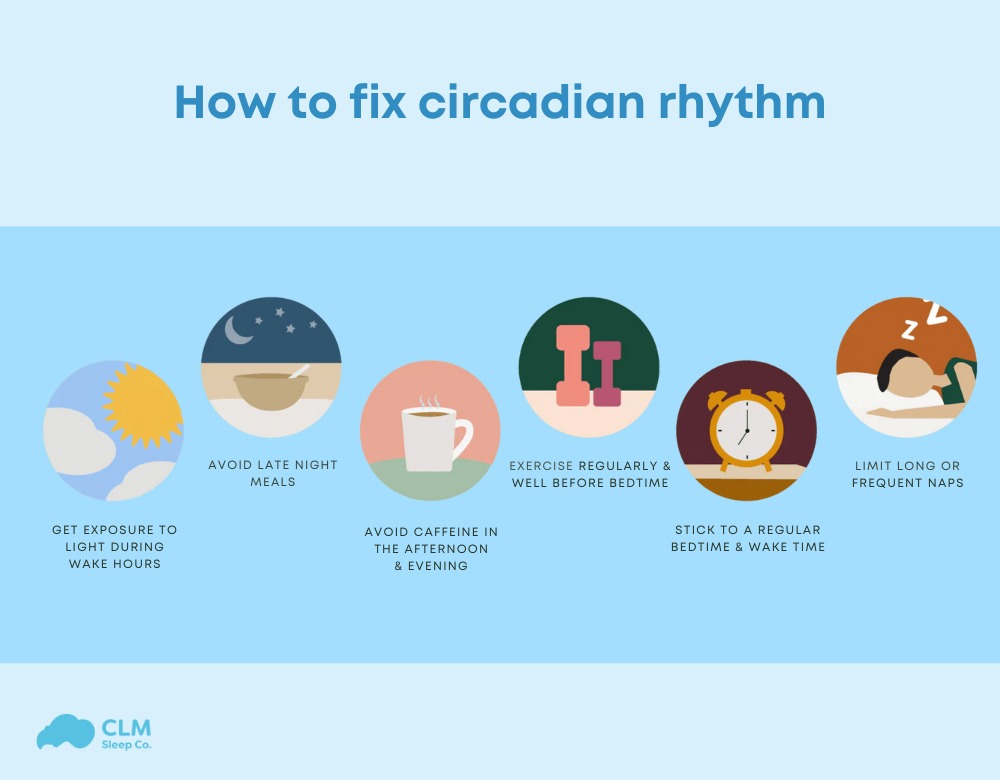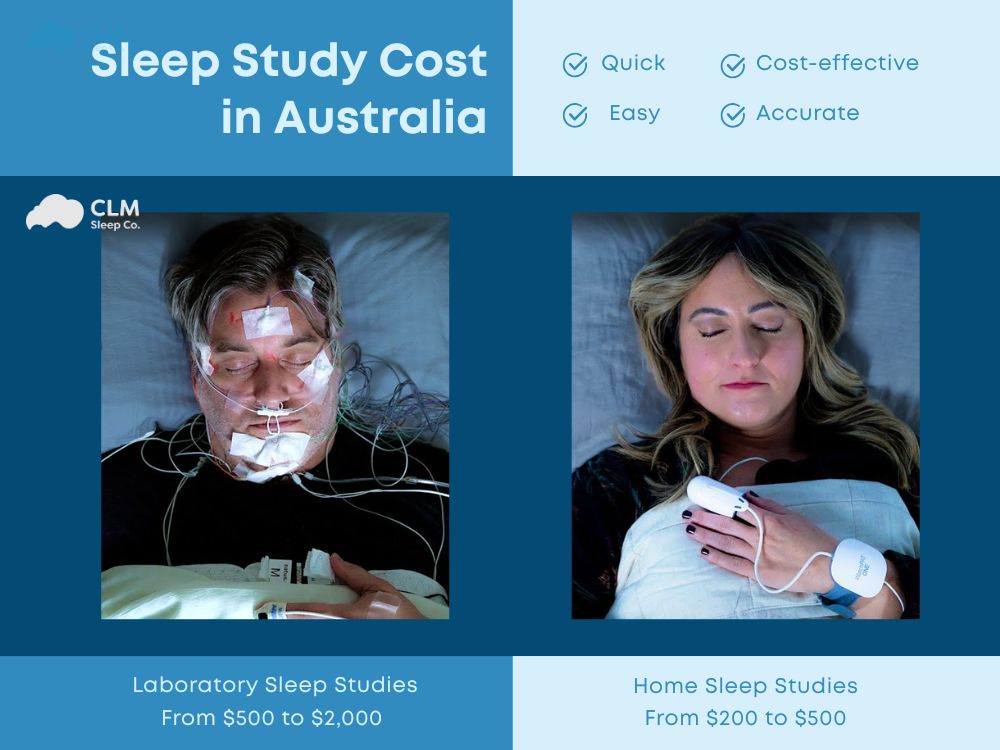Your circadian rhythm is your body’s internal clock, influencing when you feel awake, tired, and everything in between. When it’s out of sync, it can affect your sleep, mood, and energy levels. Fortunately, there are effective strategies on how to fix circadian rhythm and restore balance. In this guide, we’ll walk you through simple, actionable steps to realign your sleep-wake cycle, improve your health, and boost your overall well-being. Let’s dive into how you can fix your circadian rhythm for better sleep and a more energized life.
See more: Circadian rhythm disorder
About Circadian Rhythm
Definition
This process refers to resetting the intrinsic body timekeeper to a 24-hour repeating system controlling sleep, alertness, and other bodily functions. This entails aligning natural circadian rhythm again by keeping to regular sleep and wake schedules, increasing intake of natural light in the day, cutting exposure to blue light in the night, and healthy lifestyle practices such as balanced diet and exercising. All these steps work towards returning a proper sleep-wake cycle, hence improved sleep quality, and better general health.
Common Causes
Multiple aspects may throw off your circadian cycle, resulting in problems with sleep plus a host of health concerns. Some primary culprits are:
- Irregular sleep schedules: Altering your bedtime or wake-up time frequently will befuddle the internal clock within your body.
- Shift work: Night shift jobs or rotating shifts can completely change the amount of natural light that you get which in turn disrupts your natural rhythm.
- Excessive screen time before bed: The blue light from screens of mobile and other electronic devices can suppress melatonin production, thereby making it difficult to fall asleep.
- Traveling across time zones (jet lag): Moving swiftly across several time zones disturbs your internal clock; hence, it results in temporary sleep disruption.
- Underlying health conditions: Sleep disorders like insomnia, sleep apnea, or delayed sleep phase syndrome are capable of knocking your circadian cycle out of sync.
See more:
Signs of a Disrupted Circadian Rhythm
Your disrupted circadian rhythm can affect your body, mind, and soul significantly and usually represents early signs that tend to be pointed out for help in restoring a balanced quality of your life. The most common symptoms are:
- Difficulty Falling Asleep or Staying Asleep: Suffering to fall asleep at the same time consistently or the interruption of your night’s rest frequently.
- Excessive Fatigue and Daytime Sleepiness: Fatigue explains the persistent tiredness all the day or the exhaustion, although one has slept enough.
- Mood Swings: Those are surely irritability fits, anxiety cases now and then, and depressive episodes related to poor trying to sleep properly.
- Cognitive Impairment: Challengers face themselves with focus, memory decision-making, and fluffy-mindedness.
- Insomnia: Repeatedly trying but falling short of quickly going to sleep or ending up sleepless until you lean on walls and get exhausted.
- Memory Problems: It holds back the recording of data and processing of new and fresh ideas more effectively.
- Irregular Sleep-Wake Cycles: This maintenance process in the life of disturbed people. There is an indirect connection between the sustainability of this process and the disturbance of daily routines and responsibilities.
- Physical Health Issues: Migraine, stomach aches, or feeling slighted have been common among those individuals whose biological rhythms have gone so bad.
- Difficulty Waking Up: In the morning, it becomes difficult to jump out of bed, but for now, at least the sleep hours seem okay.
- Reduced Productivity: Reduced capacity for accomplishing tasks at work, school, or personal tasks on account of profound fatigue and cerebral abilities.
These symptoms have a major negative impact on an individual’s quality of life, indicating a need for appropriately managing the causes of the circadian rhythm disruptions.
How to Fix Your Circadian Rhythm
Setting Your Biological Clock by How to fix circadian rhythm: It can have a profound positive impact on your sleep cycle and overall health. A handful of small lifestyle changes, however, can provide the right environment for your biological clock’s reset. Three quick solutions to help revamp it are as follows:
Maintain a Consistent Sleep Schedule
Keeping and following a regular sleep schedule is one of the most effective ways “how to fix circadian rhythm”. Sleep and wake up at the same time every day of the week, weekends attached. This helps in resetting the body’s internal rhythm alongside naturally occurring light and dark cycles for rejuvenating sleep. Try not to catch up on sleep excessively during daylight hours at the cost of getting disturbed at night.
Increase Exposure to Natural Light
Going outdoors during daylight, especially in the early part of the day, may significantly enhance your circadian rhythm. Sunlight exposure helps regulate melatonin production, enhancing daytime vigilance and potentially improving sleep at night. If you are unable to go outside, then use a light therapy box that will simulate a mountain of natural sunlight, especially during those bitter winter months.
Adjust Eating Habits and Physical Activity
- Eating habits: Eating at irregular times or consuming heavy meals close to bedtime can disrupt your circadian rhythm. Try to maintain regular meal times and avoid eating large or spicy meals at least two to three hours before bed.
- Physical activity: Regular exercise is beneficial for regulating your sleep-wake cycle, but timing is crucial. Engage in moderate to vigorous exercise earlier in the day, as late-night workouts can raise your heart rate and body temperature, making it harder to fall asleep.
Lifestyle Tips for Better Sleep Hygiene
Good sleep hygiene is essential for improving sleep quality and maintaining a healthy circadian rhythm. Adopting a few lifestyle changes can help you wind down more effectively and get the restful sleep your body needs. Here are some helpful tips to enhance your sleep hygiene:
Create a Calming Bedtime Routine
A consistent bedtime routine can signal to your brain that it’s time to prepare for sleep. Incorporate relaxing activities such as reading a book, meditating, or taking a warm bath. Avoid stimulating activities like watching TV or working right before bed. Creating a comfortable sleep environment with dim lighting and a cool temperature can also enhance your ability to fall and stay asleep.
Limit Caffeine and Electronic Device Use Before Bed
- Caffeine: Avoid consuming caffeine-containing beverages such as coffee, tea, or energy drinks in the late afternoon or evening. Caffeine is a stimulant that can stay in your system for several hours, disrupting your ability to fall asleep.
- Electronic devices: Reduce screen time at least an hour before bedtime. The blue light emitted from smartphones, tablets, and computers can suppress melatonin production, delaying the onset of sleep. Consider using blue light-blocking glasses or enabling night mode on your devices to minimize exposure.
Using Melatonin and Other Supplements
Melatonin, a hormone naturally produced by your body, plays a key role in regulating sleep. Melatonin supplements can be an effective short-term solution for resetting your circadian rhythm, particularly if disrupted by jet lag or shift work. However, it’s essential to consult a healthcare professional to determine the appropriate dosage and timing. Overuse or improper use of melatonin can have unintended side effects.
Other supplements that may support better sleep include:
- Magnesium: Known for its calming properties, magnesium can help relax your muscles and improve sleep quality.
- Valerian root: A natural herbal remedy that promotes relaxation and reduces the time it takes to fall asleep.
- L-theanine: An amino acid commonly found in green tea that encourages relaxation without causing drowsiness.
Conclusion
Restoring a disrupted circadian rhythm is key to improving your sleep quality, mental clarity, and overall well-being. By maintaining a consistent sleep schedule, increasing exposure to natural light, and adjusting your eating and physical activity habits, you can gradually realign your body’s internal clock. Implementing a calming bedtime routine and avoiding stimulants like caffeine and electronics before bed will further enhance your sleep hygiene.
If you’re looking for personalized guidance or solutions to help fix your circadian rhythm, CLM Sleep is here to assist. Visit our website for expert tips, products, and support to optimize your sleep health. Start your journey to better sleep today with CLM Sleep!





